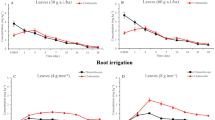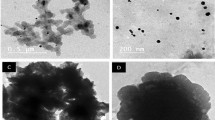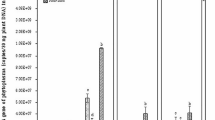Abstract
PREVIOUS work1 has shown that streptomycin sulphate, when applied as an aqueous spray to foliage, prevented the development of blast of stone fruit, caused by Pseudomonas syringae van Hall. Mitchell et al. 2 found that streptomycin was taken in and translocated upwards to the leaves when applied in a lanolin paste to bean plant stems. As part of a programme designed to gain knowledge of the movement of streptomycin in peach trees (Prunus persica (L) Batsch), investigations were carried out to determine whether streptomycin can be taken in through uninjured leaf surfaces and become systemic.
This is a preview of subscription content, access via your institution
Access options
Subscribe to this journal
Receive 51 print issues and online access
$199.00 per year
only $3.90 per issue
Buy this article
- Purchase on Springer Link
- Instant access to full article PDF
Prices may be subject to local taxes which are calculated during checkout
Similar content being viewed by others
References
Dye, D. W., and Dye, M. H., N.Z. J. Sci. Tech., A, 36, 21 (1954).
Mitchell, J. W., Zaumeyer, W. J., and Anderson, W. P., Science, 115, 114 (1952).
Dye, M. H., Ann. App. Biol. (submitted for publication).
Charles, A., Nature, 171, 435 (1953).
Author information
Authors and Affiliations
Rights and permissions
About this article
Cite this article
DYE, M. Intake of Streptomycin by Peach Leaves. Nature 178, 551–552 (1956). https://doi.org/10.1038/178551a0
Issue Date:
DOI: https://doi.org/10.1038/178551a0
This article is cited by
-
Licht- und elektronenoptische Untersuchungen über den Einfluß von Streptomycin aufSinapis alba L.
Protoplasma (1960)
-
The control of plant diseases by chemotherapy
Economic Botany (1959)
Comments
By submitting a comment you agree to abide by our Terms and Community Guidelines. If you find something abusive or that does not comply with our terms or guidelines please flag it as inappropriate.



